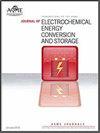海水电解和脱盐制氢批判性评论:评估当前做法
IF 1.9
4区 工程技术
Q3 ELECTROCHEMISTRY
Journal of Electrochemical Energy Conversion and Storage
Pub Date : 2023-12-29
DOI:10.1115/1.4064381
引用次数: 0
摘要
随着对可持续清洁能源解决方案的追求,人们对作为高效能源载体的氢越来越感兴趣。本文全面分析了通过海水电解和海水淡化制氢的最新技术,以满足清洁能源生产和可持续供水的迫切需要。它强调了氢作为一种多功能环保能源的重要性,以及海水淡化的重要意义。分析包括三种电解技术的比较:固体氧化物电解(SOE)、碱性电解槽(AE)和质子交换膜(PEM)电解。考虑了能源需求、资本和维护成本以及近海适用性等因素,有助于对最适合海水制氢的电解方法进行知情评估。此外,还评估了三种海水淡化技术:反渗透 (RO)、热淡化和膜淡化。评估考虑了投资和运营成本、能源需求和环境影响,深入探讨了将氢气生产与海水淡化相结合的可行性和可持续性。这篇精炼的综述从全局的角度阐述了各种技术的技术经济可行性、能源效率和环境可持续性,从而为实现更具可持续性和复原力的能源与水之间的关系做出了明智的决策。总之,本研究为氢气生产和海水淡化方面不断增长的知识库做出了贡献,提供的见解可为战略规划、政策制定和技术进步提供信息,以实现更加绿色和可持续的未来。本文章由计算机程序翻译,如有差异,请以英文原文为准。
Critical Review of Hydrogen Production via Seawater Electrolysis and Desalination: Evaluating Current Practices
The pursuit of sustainable and clean energy solutions has led to increased interest in hydrogen as an efficient energy carrier. This paper presents a comprehensive analysis of state-of-the-art technologies for hydrogen production through seawater electrolysis and desalination, addressing the critical need for clean energy generation and sustainable water supply. It emphasizes the importance of hydrogen as a versatile and environmentally friendly energy source, as well as the significance of seawater desalination. The analysis includes a comparison of three electrolysis technologies: solid oxide electrolysis (SOE), alkaline electrolyzers (AE), and proton exchange membrane (PEM) electrolysis. Factors such as energy requirements, capital and maintenance costs, and offshore suitability are considered, facilitating an informed evaluation of the most suitable electrolysis method for seawater hydrogen production. Additionally, three desalination technologies are evaluated: reverse osmosis (RO), thermal desalination, and membrane desalination. The assessment takes into account investment and operation costs, energy demand, and environmental impact, providing insights into the feasibility and sustainability of integrating hydrogen production with seawater desalination. This condensed review provides a holistic perspective on the techno-economic viability, energy efficiency, and environmental sustainability of various technologies, enabling informed decision-making towards a more sustainable and resilient energy-water nexus. Overall, this study contributes to the growing body of knowledge on hydrogen production and seawater desalination, offering insights that can inform strategic planning, policy development, and technological advancements in achieving a greener and more sustainable future.
求助全文
通过发布文献求助,成功后即可免费获取论文全文。
去求助
来源期刊

Journal of Electrochemical Energy Conversion and Storage
Engineering-Mechanics of Materials
CiteScore
4.90
自引率
4.00%
发文量
69
期刊介绍:
The Journal of Electrochemical Energy Conversion and Storage focuses on processes, components, devices and systems that store and convert electrical and chemical energy. This journal publishes peer-reviewed archival scholarly articles, research papers, technical briefs, review articles, perspective articles, and special volumes. Specific areas of interest include electrochemical engineering, electrocatalysis, novel materials, analysis and design of components, devices, and systems, balance of plant, novel numerical and analytical simulations, advanced materials characterization, innovative material synthesis and manufacturing methods, thermal management, reliability, durability, and damage tolerance.
 求助内容:
求助内容: 应助结果提醒方式:
应助结果提醒方式:


